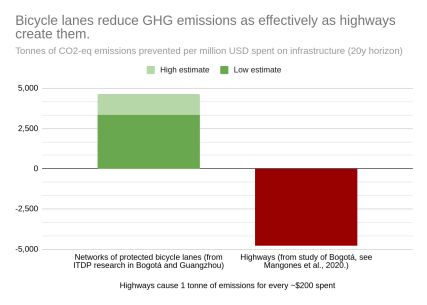A new report entitled Protected Bicycle Lanes Protect the Climate, by ITDP’s global Cycling Cities campaign with support from the FIA Foundation, finds that networks of protected bicycle lanes in low and middle-income cities can help reduce GHG emissions, lower transport costs, and prevent premature road fatalities.
In order to reduce emissions, cities need to electrify their means of transport. Unfortunately, this is quite a lengthy and expensive process. Networks of protected bicycle lanes are an extremely cost-effective way of reducing emissions. They also provide quantifiable economic benefits, paying for themselves in less than a year.
The report
This is one of the first reports on GHG reductions from networks of protected bicycle lanes. Specifically, the report focuses on the impacts of the extensive networks in Bogotá, Colombia’s major cities, and Guangzhou, China.
By using cyclists and GHG data, this study estimates the emissions reduction. These bicycle lanes networks prevent 22,000 tonnes of CO2 emissions per year in Bogotá. 16,000 tonnes in Guangzhou.
RELATED ARTICLES: 5 Cities, 5 Ways to Make Urban Mobility More Sustainable and More Equitable | The Easiest Way To Own An Electric Bike? Convert Your Old One | Colombia’s Capital Leads in Sustainable Transportation and Clean Mobility | Five Sustainable Startups From Bogotà |
To achieve the same numbers in terms of emission reduction, cities would need to plant 300,000 to 400,000 new trees every year. In contrast, for every $200 spent on highways, 1 tonne of GHG emissions per year will be created. While the same spend on protected bicycle lanes would mitigate almost exactly the same amount

The other benefits of bicycle lanes
Investing in cycle lanes provides a myriad of economic and social benefits to cities as well. According to the report, Bogotá’s network cost an estimated 132 million USD to build. It saves travelers 80 million USD per year and prevents 300 deaths per year. Guangzhou’s network cost an estimated 69 million USD to build. It saves travelers 30 million USD per year and prevents 50 deaths.
Prioritizing investments and policies that expand cycling infrastructure is one of the keys to shifting a significant share of trips from emissions-heavy private vehicles towards cycling as an essential, low-carbon mode of transport. Especially, networks of physically-protected bicycle lanes, rather than individual or unprotected lanes are a much better choice.
In conclusion, cities urgently need to support more low-carbon modes of transport to reduce their emissions and address climate change. The lessons drawn from Bogotá and Guangzhou in this report demonstrate that networks of protected bicycle lanes should be considered essential. In addition, researchers have published a free and user-friendly modeling tool to predict the impacts of any proposed network of bicycle lanes in detail. (Microsoft Excel or Google Sheets)
Thoughts from ITDP & FIA Foundation
Sheila Watson, Deputy Director of FIA Foundation believes this report shows the benefits of urban cycling “It is extraordinary to see that dollar-for-dollar, protected cycle lanes are not just carbon neutral but fully mitigate the greenhouse gas emissions created when the same amount of spending goes on highways. The case for investment in cycling is not just good financial sense. It is essential for healthier, safer, and more equitable cities.”
ITDP CEO Heather Thompson thinks that protected cycle lanes are key to ensuring more sustainable and inclusive urban mobility. “This report presents crucial evidence that extensive networks of protected lanes lead to more cycling, which in turn helps to reduce GHG emissions by reducing cars on the road. Now is the moment for governments and financiers to ensure that more protected cycle lane networks are built as a fast, affordable solution to climate change. The evidence is here – the time to act is now.”
Editor’s Note: The opinions expressed here by Impakter.com columnists are their own, not those of Impakter.com. In the Featured Photo: A bike Lane over a bridge. Photo credit: Unsplash.











